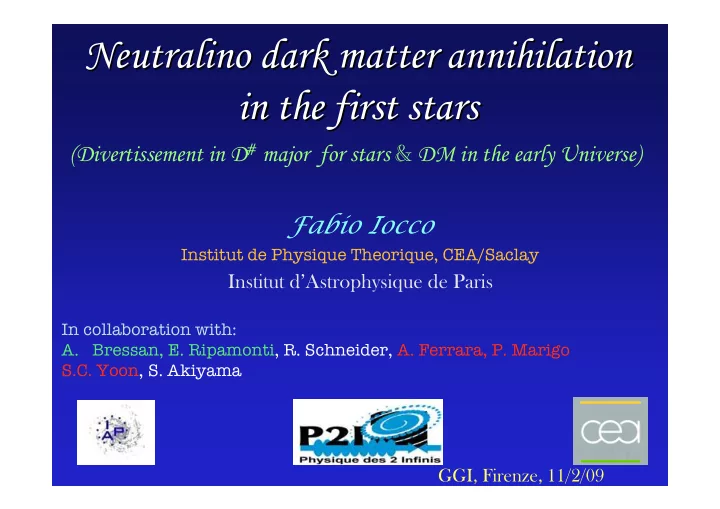

Neutralino dark dark matter annihilation matter annihilation Neutralino in the first stars stars in the first (Divertissement in D # major for stars & DM in the early Universe) Fabio Iocco Institut de Physique Theorique, CEA/Saclay Institut d’Astrophysique de Paris In collaboration with: A. Bressan, E. Ripamonti, R. Schneider, A. Ferrara, P. Marigo S.C. Yoon, S. Akiyama GGI, Firenze, 11/2/09
The first stars (Population III) Form in halos of M h ≈ 10 6 Msun at z ≈ 20 (T vir < 10 4 K) First Stars ⇒ primordial chemical composition (BBN: no C,N,O -- A > 7) Weak cooling: H 2 vs CO ⇒ big masses Smooth collapse, at the center of the halo No fragmentation, one star per halo Live fast, die young (30-300Msun go SNe) Hot: first engines for IGM Reionization (possibly) seed BH, correlated to quasars As of now, we have (very likely) not seen one yet
Building the DM cusp Gas (collisional) cooling and collapsing to the center “pulling in” DM (gravitationally) (modeled through adiabatic contraction) Spolyar, Freese & Gondolo 07 (PRL 100, 2008) Iocco + 08 (also Freese+ 08)
Powering the structure (with DM) Energy production DM profile critical profile critical! ! DM + Energy deposition Energy repartition for WIMP annihilation: 1/3 electrons 1/3 photons 1/3 neutrinos (lost) Absorption: Gas profile critical! Natarjan, Tan & O’ Shea 08
) first first stars stars can can do do it it ! ! (only only) ( At n gas ~10 12 #/cm 3 (and above) structure opaque to annihilation products Spolyar, Freese & Gondolo 07 (PRL 100, 2008)
So what? 100 Msun initial conditions: R=10 14 cm n gas =10 16 #/cm3 delicate equilibrium between accretion (or DM cusp build-up) and annihilation Iocco, et al., MNRAS 390, 2008
Dark Star (à la Freese) Dark Star Polytropic EoS for the gas Mass accretion ≈ 10 -3 Msun/yr T ≈ 10 5 K, t ≈ 10 6 yr, R ≈ 10 14 cm Long timescales, accretion of SMBH While gas structire sustained by DM (?) Freese et al, 08
Evolving “Dark Stars” Adiabatic Contraction phase Acts at proto-stellar stages (or early pre-MS) at T ≈ 5000 K Adopted fiducial values: ( m X =200GeV, shorter times) Iocco +, MNRAS 390, 2008
AC: a transient phase transient phase AC: a ( παντα ρει και ουδεν µ ενει ) ( παντα ρει και ουδεν µ ενει ) All groups seems to agree! (aside details)
Scattering and capture Captured WIMPs accumulate Halo WIMPs (originally outside the star) are captured inside the star, thermalizing (need some time) “sinking” to the center (most of annihilations is there) by scattering off the gas of the star scattering off the gas of the star by
DM and stars: scattering and capture Capture rate C “ Dark Luminosity ” inside the star Dark Luminosity WIMPs thermally relaxed within the star At equilibrium Weak dependence on WIMP annihilation ≈ point-source self-annihilation rate R X ≈ 10 9 cm<R c < σ v> Equilibrium timescales Seminal literature by: Gould, Griest, Press, At ZAMS Raffelt,Salati, Seckel, t kh >> τ th > τ X Spergel
DM burning burning Stars have negative specific heat: feed them with energy,they will cool down Nuclear burning switch-off (take-over of DM) Fairbairn et al. 07 “Cool things start happening at about 10 8 GeV/cm 3 ” ( σ 0 =10 -38 cm 2 ) M. Fairbairn Scott et al. 08 for a detailed analysis of DM & stars at the GC Taoso et al 08
So what, once they become “DM burners” ? Active in late stages of pre-MS on Hayashi track τ KH < τ DM Iocco, Bressan, Ripamonti, Schneider, Ferrara, Marigo; MNRAS 390, 2008
DM burning: effects on the pre-MS During AC phase 100M sun R=1.2x10 14 cm, L X ≈ 10 37 erg/s, ρ X =10 12 GeV/cm 3 τ th >>t KH Do NOT ignite nuclear reactions “frozen” stars Nuclear burning slowly evolving active! Iocco, et al., MNRAS 390, 2008
Prolonged lifetimes DM powered stars are “ frozen frozen ” as long as environmental DM stays supecritical Taoso, Bertone, Meynet & Ekstrom 08 frozen evolving evolving σ SD 0 =10 -38 cm 2 Iocco+ 08
Why should you care? (surviving the ages) z (not actual size) Halo merger DM cusp erosion (baryons + self-annihilation) Bertone & Merritt 05 Wechsler + 02
Some more properties (useful for indirect detection) # ionizing photons! (tricky: increase or decrease depending on DM density) Chemistry (yeah: analize that!) Yoon, Iocco & Akiyama, ApJL 688, 2008
The Physics of Reionization (how easy to reconstruct DM properties through PopIII observations) Structure Formation: Collapse of the cloud Sources A little more time to UV model our observables… Soft X-rays IMF Metal SFR Production H 2 dissociation H 2 formation Cloud temperature Ionization of IGM
Concluding In the early Universe: TWO phases of DM annihilation in stars TWO AC stalling phase (Dark Star) is transient, details yet to be understood DM burning prolonges stellar lifetimes (up to “freezing” the stars) Which effects on on local local feedback and feedback and Reionization Reionization? ? Which effects Need to understand their environment evolution Need to understand their environment evolution
Recommend
More recommend